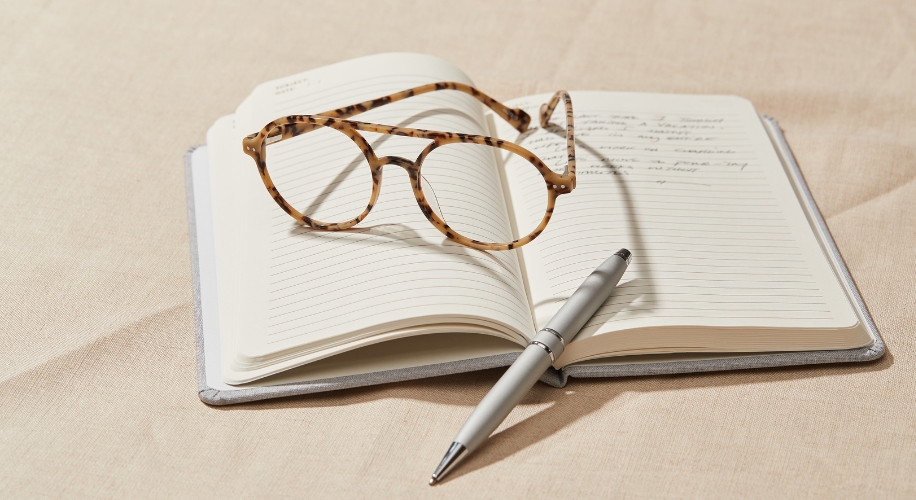Guide to Choosing the Right Reading Glasses Magnification
- BY Dr. Steven Liem
- IN Glasses
What’s Inside!
- Starting Point for Magnification: Begin with a reading test to determine your vision needs. This is especially important for those who haven’t needed glasses before. For complex prescriptions or specific concerns, consult an eye care professional.
- Understanding Magnification Levels: Magnification in reading glasses is measured in diopters, ranging from +1.00 (minor difficulties) to +3.00 (significant close-up vision struggles). Choose the lowest magnification that allows comfortable reading.
- Selecting Quality Reading Glasses: Consider frame material, lens coatings, and comfort fit for durable and comfortable glasses. Zenni Optical offers a variety of styles to match personal preferences.
- When to Update Your Glasses: Regularly reevaluate your magnification needs, especially if you experience headaches, eye strain, or difficulty focusing. Keeping an up-to-date prescription ensures clear sight and overall eye health.
When it comes to selecting reading glasses, the right magnification is crucial for clear and comfortable vision. Understanding how magnification works and determining the level you need can make all the difference. Whether you’re looking to update your current spectacles or considering your first pair of readers, this guide is designed to help you make an informed decision.
Finding Your Starting Point
Before diving into the vast selection of reading glasses, it’s essential to get a sense of your current vision needs. The first step in this journey is a reading test, which typically involves reading a chart or text from a comfortable distance to pinpoint the magnification strength that allows you to see clearly without straining your eyes. This guide is best suited for individuals who are emmetropic, or have not needed glasses up to this point in life. If you have specific concerns or a complex prescription, it’s always best to consult with an eye care professional.
Understanding Magnification Levels

Magnification in reading glasses is measured in diopters, which indicate the degree of thickness in the lens that corrects your vision. Here’s a quick guide to the diopter scale:
- +1.00 to +1.25 diopters: Ideal for those who have minor difficulties with reading small text.
- +1.50 to +1.75 diopters: Suitable for individuals who need a little more assistance for everyday reading tasks or at a computer distance.
- +2.00 to +2.50 diopters: Designed for those who hold reading materials at arm’s length to focus properly.
- +2.75 to +3.00 diopters: For readers who struggle significantly with close-up vision and detail work.
Note that the higher the diopter, the more magnification the lens provides. It’s important to start with the lowest magnification that helps you read comfortably, as too high of a diopter can cause eye strain or headaches.
Choosing Quality Reading Glasses
Once you’ve determined your ideal magnification level, the next step is to select a pair of reading glasses that offer comfort, style, and durability. At Zenni Optical, we understand that eyewear is not just about vision but also about expressing your personality. Consider the following aspects when choosing your readers:
- Frame Material: Look for lightweight and sturdy materials like acetate or metal that can withstand daily wear and tear.
- Lens Coatings: Options like anti-reflective coatings can reduce glare and improve the clarity of your vision.
- Comfort Fit: Ensure the frames fit well without slipping down your nose or pinching behind your ears.
Our selection of reading glasses caters to a variety of face shapes and sizes, ensuring that you can find the perfect pair that feels as good as it looks.
When to Update Your Reading Glasses

Over time, your vision can change, which means your reading glasses may need an update. Signs that it’s time for a new pair include frequent headaches, eye strain, or difficulty focusing on text that was once clear with your current pair. It’s wise to reevaluate your magnification needs periodically, especially if you notice changes in your vision. Keeping an up-to-date prescription is not only about clear sight but also about maintaining overall eye health.
With the right magnification and a pair of quality reading glasses, you’ll be able to enjoy your favorite books, work on intricate hobbies, or go through paperwork without the unnecessary strain on your eyes. Remember to recheck your vision needs regularly and to explore our stylish and affordable options at Zenni Optical to keep your vision sharp and comfortable. Your eyes will thank you!


